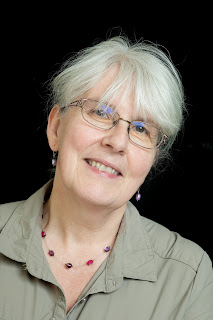I remember when my husband bought our first computer, thirty years ago now. I was pregnant with our first child, and I wondered what on earth people would do with one. A PC, that is, not a child. Now I’m rarely off the thing. I have a study with a proper work desk, and my secretary’s chair is the comfiest in the house. I use writing as the perfect excuse for avoiding housework: ‘But I am working!’ The downside of this is a chronic tennis elbow, which currently limits my writing time.
I started writing ‘poems’ in school, mostly about rugby and heavily influenced by Max Boyce, the Welsh comedian. I’ve come a long way since then: an Open University diploma in creative writing, membership of the Romantic Novelists’ Association New Writer Scheme (to learn my romance-writing trade) and so on. But I found my natural home writing pocket novels for DC Thomson – My Weekly and The People’s Friend – and I love it. I’m an avid crime reader, though prefer to write romance. With pocket novels, you can combine both. I write short stories for these magazines, too, and am currently half-way through a serial for The People’s Friend. It’s set on an art retreat set in Umbria, based on a real trip just after the Grenfell tower disaster when we were staying in a huge forest in the middle of a drought and with an arsonist on the loose! You can imagine how my imagination ran riot with that scenario.
Over the years I have developed a large, supportive network of writing friends. I can’t stress how important this is if you want to take writing seriously. It’s so easy to hide away in your writing place all day, speaking to no one until it’s time to try to find a home for your work. And for an introvert like me, developing this network was really hard. But I learn so much from other writers – in fact I’d never have heard of the Pocket Novels without my women’s magazine writer friends. During lockdown, several writing buddies started meeting on Zoom twice a month to keep sane, and we still do it. And I seem to have zoom meetings with no end of other groups whose members are spread around the country, too.
Apart from the serial, most of my current writing activity involves preparing previously published pocket novels for self-publication as e-books. This is so much work, I’m not sure I’d have started if I’d realised what was involved. But it’s worth it to see your work up there, and the covers produced by my cover designer are amazing. Currently I have only one ebook available, but I’m about to publish book number two – Where There’s a Will. This is a pure romance set at the time of William IV, who came between George IV and Victoria. It was an interesting period, and my romance takes place in the year of The Reform Act which saw Earl Grey’s government finally abolish rotten boroughs. Industrialists were on the rise and landed gentry on the wane. And yet women still often relied on a man to run things, which is why Julia needs to marry the steward to save the family home.
I got the idea from reading about Sir William Paxton, who regenerated the now thriving resort of Tenby and, on his death, provided for his children by selling most of his estate. Julia’s home will be sold for the same reason, although her father, Sir Henry Watson, had ulterior motives, as the reader will find out.


